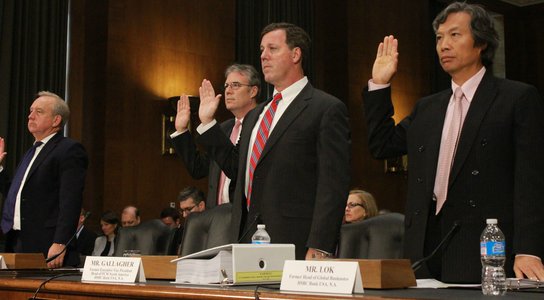This week, I’ll be attending the International Anti-Corruption Conference in Malaysia. I’ll be working with civil society and government colleagues from all over the world to figure out practical solutions to tackle the corruption that keeps citizens in poor countries poor and destabilises countries like Syria, Ukraine and Libya.
This issue has been in the news a lot recently – it won’t surprise anyone to hear I think that’s a good thing. Most notably, a recent speech by the UK’s Prime Minister brought much needed attention to the problem of funds stolen from state coffers flowing out into the global financial system.
That’s also the subject of a new Global Witness report, Banks and Dirty Money. This report highlights how banks help corrupt officials plunder money and spend it without detection. This is a largely hidden problem, but we won’t end corruption unless we address it.
The report reveals:
- How corrupt officials rely on banks to hide their ill-gotten gains. Most countries have laws and regulations which require banks to do checks to make sure they aren’t being used to launder the proceeds of corruption or other crimes. While many banks do a good job at upholding these rules, a large number do not. That leaves the door wide open for corrupt officials looking to launder the money they steal or take in bribes.
- A long history of banks taking stolen assets. For example, our analysis of a World Bank study covering a sample of 200 corruption cases - in which a total of $56 billion was stolen from state budgets - shows that 140 banks handled these illegal proceeds. This included more than a third of the 50 biggest banks in the world.
- The causes of this and other persistent rule
breaking by banks. In particular, we show how a system of skewed incentives means
the people who run banks face no consquences for their firm’s wrongdoing. For example, how France’s biggest bank BNP
Paribas knowingly broke U.S. Sanctions to Sudan, according to the New York
regulator “with the knowledge of multiple senior executives – engaged in a
long-standing scheme that illegally funneled money to countries involved in
terrorism and genocide”.
- A range of solutions, including holding senior
executives personally responsible as part of much tougher enforcement of the
rules needed by regulators around the world, to stop banks continuing
to facilitate this corruption.
- Why this all this matters: corruption comes at a devastating human cost. In poor countries it countries it kills people and traps millions more in poverty. The looting of government budgets decimates funds that could have been spent on hospitals, schools and other basic services. In Nigeria, for example, just one tenth of the $35 billion lost to corruption in the oil industry over a decade would have been enough to give an education to the 5.5 million girls currently out of school there. Corruption also undermines the global economy, and threatens national security, affecting all countries around the world.
The full report, with four illuminating case studies, infographics highlighting the history of banks breaking the rules and a range of key statistics, and clear set of the recommendations for action, can be read here.
I’ll be available for comment on these issues for those attending the summit in Malaysia.


